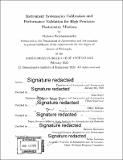Instrument systematics calibration and performance validation for high precision photometry missions
Author(s)
Krishnamurthy, Akshata.
Download1199059786-MIT.pdf (42.82Mb)
Other Contributors
Massachusetts Institute of Technology. Department of Aeronautics and Astronautics.
Advisor
Sara Seager.
Terms of use
Metadata
Show full item recordAbstract
Exoplanet detection using planetary transits requires very high precision photometry. The systematic noise requirement on photometry missions is limited to tens of parts per million over few hour timescales. The present work focuses on developing a generalized framework to improve bright star photometry for both large space-based telescopes and small satellite missions. The framework uses active integration with inherent feedback mechanisms in order to maximize the utility of results from three functional areas: simulation and modeling, laboratory characterization, and flight data analysis techniques. We systematically assess the performance of the system by identifying, characterizing, calibrating, and removing the major systematic noise sources from the flight data with the goal to establish a noise floor for the mission. We present two applications namely the Transiting Exoplanet Survey Satellite (TESS) and Arcsecond Space Telescope Enabling Research in Astrophysics (ASTERIA). TESS is a NASA Astrophysics Explorer mission that was successfully launched in April 2018. The present work establishes a noise floor of 16 ppm at 4 hours for TESS by evaluating hundreds of non-variable bright stars over multiple sectors of observation. We also develop methods to improve the photometric performance for outliers that do not conform to the noise floor. In addition, we develop laboratory techniques to very precisely characterize key detector properties such as absolute quantum efficiency and charge blooming. ASTERIA is a 6U CubeSat that was deployed into a low-earth orbit in November 2017. The present work provides a framework to assess the photometric performance of ASTERIA by developing one of the first data analysis pipelines for CMOS science. We demonstrate photometric precision of 65 ppm at 2 hours for HD219134, and 15 ppm at 2 hours for Alpha Centauri. We also present in-flight calibration and ground characterization tests of the camera assembly to characterize and remove significant noise sources such as fixed pattern noise and temperature variations. Using the results from this research, we develop a pipeline-driven approach for calibration test development for SPARCS, an upcoming JPL CubeSat mission to demonstrate UV photometry, and provide guidelines for early design phase noise budgeting and detector selection for the ASTERIA constellation concept.
Description
Thesis: Ph. D., Massachusetts Institute of Technology, Department of Aeronautics and Astronautics, 2020 Cataloged from the PDF of thesis. Includes bibliographical references (pages 239-250).
Date issued
2020Department
Massachusetts Institute of Technology. Department of Aeronautics and AstronauticsPublisher
Massachusetts Institute of Technology
Keywords
Aeronautics and Astronautics.